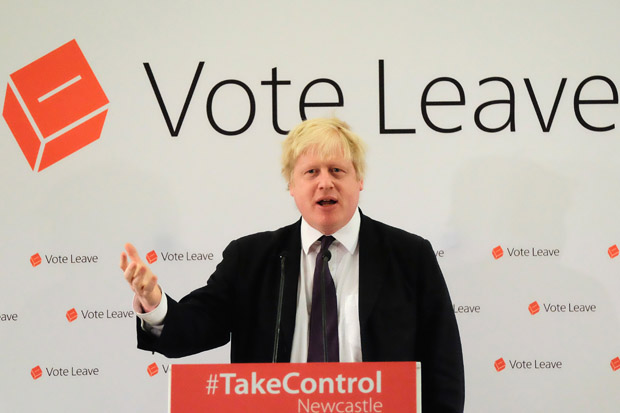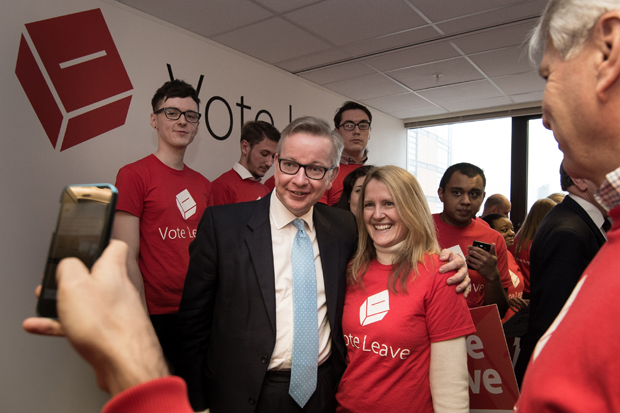One of the interesting features of the Brexit debate is that it has laid bare a schism in British society which runs much deeper than the conventional Labour-Conservative divide. On the one hand, we have the prosperous, educated elite, mainly based in cities and university towns, who are liberal on social issues, pro-immigration, believers in free trade and internationalist in outlook. On the other, we have the white working class, clustered in areas of economic stagnation, particularly seaside towns, who are socially conservative, anti-immigration, suspicious of free trade and staunchly nationalist.
This isn’t a perfect summary. Dan Hannan, Boris Johnson and Michael Gove fall more naturally into the first category, whereas Scottish and Welsh nationalists are mainly pro-EU. But it’s broadly true. Two years ago, the political scientist Chris Hanretty ranked all 650 British constituencies according to how likely they were to support Brexit. The five least eurosceptic are Edinburgh South, Manchester Withington, Edinburgh North and Leith, Bristol West and Hornsey and Wood Green, whereas the five most are Clacton, Castle Point, Great Yarmouth, Christchurch and Blackpool North and Cleveleys.
On the face of it, this is a good argument for Remain. ‘Clacton-on-Sea is going nowhere,’ wrote Matthew Parris in an infamous Times column about Ukip’s only seat. ‘This is Britain on crutches. This is tracksuit-and-trainers Britain, tattoo-parlour Britain, all-our-yesterdays Britain.’
He is right, up to a point. Brexiters are less educated (only 15 per cent are graduates, says YouGov, against 37 per cent of Remainers) and older (Clacton has the highest proportion of retirees in England and Wales). These elderly, uneducated, lumpen proles are dying off, goes the argument, so why pander to their Little England prejudices? It would be crazy to risk trading links, renege on international obligations and clamp down on immigration just to make a bunch of losers feel less out of place in the modern world. (Parris: ‘A Britain that has forgotten the joys of Ken Dodd, meat pies, smoking in pubs and the Bee Gees.’) Whereas a vote to Remain is a vote for the Britain of tomorrow: young, educated, multi-ethnic, pansexual and cosmopolitan.
But is that really a good reason to stay in? It’s a peculiarly heartless argument and sits oddly with Europhiles’ self-understanding as the nice guys. It’s a toxic mixture of snobbery and ad hominem: let’s vote Remain because the people who want to Leave eat too much cake, to channel Emma Thompson. Swap white working class for another demographic (African-Caribbean, for instance) and it’s straightforwardly racist, though good luck trying to persuade the police to take a charge of anti-white racism seriously. They’d probably arrest you for being ‘offensive’.
In fact, I think the growing chasm between the winners and the losers from globalisation is a reason to vote Leave. The Europhiles naively imagine that in 30 years the whole country will look more like them. But as mass immigration continues and more and more menial jobs are done by robots, Britain will come to look more like Clacton, not Edinburgh South, and the white working class will be joined by members of other ethnic groups.
For a glimpse into the future, take a tour of America’s rust belt, where communities like Port Clinton, the subject of Robert Putnam’s book Our Kids, have come to resemble a post-apocalyptic dystopia. The rich are happily married with successful, college-educated children and live in gated communities protected by security, while the poor sprawl out over sink estates, unable to sustain relationships or hold down jobs, prone to alcoholism and substance abuse, passing on their problems to the next generation like poisoned heirlooms.
For Britain to avoid this fate, the metropolitan elite must take some responsibility for the residents of England’s depressed seaside towns, not scorn them. And they’re more likely to do that, to feel the tug of moral obligation towards their fellow countrymen, if they identify as Britons first and Europeans second. Nationalism, for all its shortcomings, creates a shared sense of belonging that’s essential if the haves are ever going to give a helping hand to the have-nots. Let’s embrace the people who’ve been left behind by globalisation by voting Leave on 23 June, not cut them adrift by voting Remain.
Got something to add? Join the discussion and comment below.
Get 10 issues for just $10
Subscribe to The Spectator Australia today for the next 10 magazine issues, plus full online access, for just $10.
Toby Young is associate editor of The Spectator.
You might disagree with half of it, but you’ll enjoy reading all of it. Try your first month for free, then just $2 a week for the remainder of your first year.















Comments
Don't miss out
Join the conversation with other Spectator Australia readers. Subscribe to leave a comment.
SUBSCRIBEAlready a subscriber? Log in